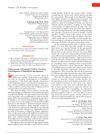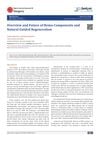 29 citations,
December 2019 in “Transfusion and Apheresis Science”
29 citations,
December 2019 in “Transfusion and Apheresis Science” Platelet-derived bio-products help in wound healing and tissue regeneration but lack standardized methods, and their use in medicine is growing.

Chemicals and stem cells combined have advanced regenerative medicine with few safety concerns, focusing on improving techniques and treatment effectiveness.
 August 2023 in “International journal of medical science and clinical research studies”
August 2023 in “International journal of medical science and clinical research studies” PRP therapy helps heal pediatric surgical wounds faster and with fewer scars but needs more research for safety and cost.
 2 citations,
March 2019 in “Plastic and Reconstructive Surgery”
2 citations,
March 2019 in “Plastic and Reconstructive Surgery” The letter suggests that a modified fat processing technique may increase regenerative cells but calls for more trials to confirm its effectiveness for skin and hair treatments.
 16 citations,
December 2019 in “Journal of Cellular and Molecular Medicine”
16 citations,
December 2019 in “Journal of Cellular and Molecular Medicine” Sonicated platelet-rich plasma boosts hair growth by activating stem cells.
7 citations,
August 2020 in “Plastic and reconstructive surgery. Global open” QR 678 and QR 678 Neo are safe and promote hair growth, potentially helping chemotherapy-induced hair loss.
 7 citations,
January 2019 in “Annals of dermatology/Annals of Dermatology”
7 citations,
January 2019 in “Annals of dermatology/Annals of Dermatology” Synthetic ceramides may help hair growth by boosting cell growth in hair follicles.
1 citations,
May 2021 in “Dermatology practical & conceptual” Iontophoresis with growth factors safely and effectively promotes hair regrowth without discomfort.
 7 citations,
September 2017 in “Biomedical and Pharmacology Journal”
7 citations,
September 2017 in “Biomedical and Pharmacology Journal” Growth factors greatly affect hair loss, with different levels seen in men, women, younger patients, and at the start of the condition.
 36 citations,
June 2018 in “Journal of Dermatology”
36 citations,
June 2018 in “Journal of Dermatology” Use finasteride, dutasteride, and minoxidil for hair loss treatment.
 May 2015 in “Hair transplant forum international”
May 2015 in “Hair transplant forum international” The article concludes that PRP might help with hair loss, but more detailed research is necessary.
 16 citations,
May 2013 in “Urology”
16 citations,
May 2013 in “Urology” Metabolic syndrome linked to urinary symptoms; hair loss not significant.
 March 2017 in “Open access journal of surgery”
March 2017 in “Open access journal of surgery” The document concludes that more standardized research is needed to fully understand and optimize the use of platelet-rich fibrin in regenerative medicine.
 2 citations,
June 2022 in “Cosmoderma”
2 citations,
June 2022 in “Cosmoderma” Regenerative medicine shows promise for improving hair and skin but needs more research for standard use.
December 2011 in “대한본초학회지(본초분과학회지)” Gyungohkgo-gamibang extract significantly promotes hair growth and thickness.
 November 2021 in “Authorea (Authorea)”
November 2021 in “Authorea (Authorea)” PRP treatments and hair transplantation may be linked to the progression of pseudolymphoma to lymphoma.
17 citations,
June 1997 in “Baillière's clinical obstetrics and gynaecology” Scientists now better understand how human hair growth is controlled, including the roles of specific genes and proteins.
 8 citations,
June 2022 in “Frontiers in bioengineering and biotechnology”
8 citations,
June 2022 in “Frontiers in bioengineering and biotechnology” A patch made from human lung fibroblast material helps heal skin wounds effectively, including diabetic ulcers.
 26 citations,
July 2021 in “Frontiers in Cell and Developmental Biology”
26 citations,
July 2021 in “Frontiers in Cell and Developmental Biology” The review suggests that a special cell-derived treatment shows promise for various skin conditions and hair growth but needs more research for confirmation.
 6 citations,
January 2018 in “Journal of Cellular Physiology”
6 citations,
January 2018 in “Journal of Cellular Physiology” Human scalp fat stem cells showed improved cartilage-like development on a special scaffold with freeze-thaw treatment.
 January 2023 in “Biomedicine & Pharmacotherapy”
January 2023 in “Biomedicine & Pharmacotherapy” Low oxygen conditions improve how well certain stem cells from embryos can make hair grow longer and faster.
 June 2017 in “Journal of The American Academy of Dermatology”
June 2017 in “Journal of The American Academy of Dermatology” LED light helps hair follicle cells grow and prevents them from dying by activating certain cell pathways.

New treatments for hair loss, including a compound called "ALRV5XR", platelet-rich plasma, and Adult Stem Cell-based therapy, are showing promise, but more trials are needed for confirmation.
 15 citations,
January 2014 in “BioMed Research International”
15 citations,
January 2014 in “BioMed Research International” Heparin and protamine are promising in tissue repair and organ regeneration, including skin and hair.
 2 citations,
August 2011 in “InTech eBooks”
2 citations,
August 2011 in “InTech eBooks” New methods for growing skin cells can improve skin grafts by building blood vessels within them.
 5 citations,
January 2013 in “Otorhinolaryngology clinics : an international journal”
5 citations,
January 2013 in “Otorhinolaryngology clinics : an international journal” Platelet-rich plasma may improve healing and hair growth in cosmetic surgery but results vary.
 1 citations,
July 2023 in “Cytotherapy”
1 citations,
July 2023 in “Cytotherapy” Magnetic nanovesicles from stem cells can improve hair growth by staying in the skin longer.
 April 2016 in “The journal of investigative dermatology/Journal of investigative dermatology”
April 2016 in “The journal of investigative dermatology/Journal of investigative dermatology” M2 macrophages help hair regrowth in wounds by making growth factors.
 December 2023 in “Jurnal Penelitian Pendidikan IPA”
December 2023 in “Jurnal Penelitian Pendidikan IPA” PRP heals pockmarked skin better than salmon DNA serum.
 16 citations,
March 2008 in “Dermatologic Surgery”
16 citations,
March 2008 in “Dermatologic Surgery” Hydrogen peroxide's effects on wound healing in hair transplants are unclear, and it may slow healing and increase scarring.

























